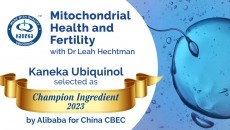Special edition: Eye health
Meso-zeaxanthin: Where do we stand on the eye health sector’s controversial and emerging ingredient?

Meso-zeaxanthin was singled out in recent headlines when the French Directorate General of Competition, Consumer Affairs and Fraud Prevention (DGCCRF) published the findings of a two-year investigation into the mislabeling of eye health supplements.
The regulatory status of the compound, one of three macular carotenoids along with lutein and zeaxanthin, is thorny. EFSA rejected a health claim relating to meso-zeaxanthin in 2010, stating that “a cause and effect relationship has not been established between the consumption of meso-zeaxanthin and maintenance of normal vision”. Despite the negative opinion, the panel did acknowledge that, “Meso-zeaxanthin is a dietary carotenoid and is measurable in foods by established methods. The Panel considers that the food constituent, meso-zeaxanthin, which is the subject of the health claim is sufficiently characterised.”
According to Dick Roberts, PhD, principal manager of scientific affairs & technical services for Kemin Human Nutrition and Health Division, meso-zeaxanthin would be a new dietary ingredient (NDI) for supplements as it was not marketed in the US prior to October 15, 1994, which would allow it to be grandfathered in according to DSHEA.
On the other hand, OmniActive Health Technologies submitted a GRAS notification to the FDA for its Lutemax 2020 Lutein and Enhanced Levels of Zeaxanthin Isomers, which contains 67% lutein, 6.75% zeaxanthin, and 6.75% meso-zeaxanthin. The Agency issued a letter of no objection in 2011, allowing the ingredient to be used in an extensive range of foods and beverages and medical foods.
Industrial Organical S.A. de C.V. from Mexico has submitted a GRAS notification specifically for meso-zeaxanthin (filing date: Aug 28, 2013), and the FDA’s response is still pending.
The science
In the past we ran a series of comments from Kemin, which has taken the stance that the science behind meso-zeaxanthin is in its infancy and our knowledge is limited, and Prof John Nolan and Prof Stephen Beatty from the Macular Pigment Research Group at the Waterford Institute of Technology in Ireland, who are convinced that all three macular pigments (lutein, zeaxanthin, and meso-zeaxanthin) are required for optimal eye health.
“It seems to us that inadequate understanding, premature conclusions and misguided interests are fueling the meso-zeaxanthin controversy,” said Lynda Doyle, VP of Global Marketing, OmniActive Health Technologies.
“To further support meso-zeaxanthin’s safety, there are hundreds of products on the market from multiple manufacturers around the world that legitimately use meso-zeaxanthin alongside RR-zeaxanthin and lutein with no adverse events reported,” she added.
A 2013 study published in Food and Chemical Toxicology by David Thurnham from the University of Ulster and Alan Howard from the University of Cambridge concluded meso-zeaxanthin has a no-observed-adverse-effect-level (NOAEL) of over 200 mg per kg or body weight, “and this is at least 1400 times higher than the typical supplement dose”.
Key studies
It is true that there are significantly more publications focusing on lutein and zeaxanthin than those that also consider meso-zeaxanthin. Kemin’s Dr Roberts noted that over 135 supplementation studies have been published using lutein and zeaxanthin, compared with fewer than ten separate published human studies in which significant amounts of meso-zeaxanthin was provided as a quantifiable dietary.
“Because of the difficulties of separating lutein, zeaxanthin, and meso-zeaxanthin in order to obtain pure meso-zeaxanthin for supplementation studies, there have been no reported human supplementation studies conducted on meso-zeaxanthin alone,” he said. “All of the published studies have been conducted with a supplement that also includes meaningful amounts of lutein and zeaxanthin.”
A 2008 study by Thurnham et al (British Journal of Nutrition, Vol. 100, pp. 1307-1314) suggested that meso-zeaxanthin may “slightly depress” the uptake of lutein and zeaxanthin into the plasma. Subsequent studies, however, have reported additional benefits from formulations including all three macular carotenoids, including a 2013 report by Meagher et al. in the British Journal of Nutrition (Vol. 110, pp. 289-300) which concluded: “[A] formulation containing all three macular carotenoids was more efficacious in terms of achieving a higher concentration of circulating levels of total macular carotenoids, thereby potentially optimizing the bioavailability of these compounds for capture by the target tissue (retina).”
Debate
“The science behind the use of meso-zeaxanthin is still in its infancy,” said Dr Roberts. “Unlike lutein and zeaxanthin which are found in the brain, in breast milk, and other tissues as well as the eye, meso-zeaxanthin is only concentrated in a very localized area of the macular in the eye. It would be important for researchers to determine whether there are safety issues associated the uptake of meso-zeaxanthin into organs and body-systems where it is not inherently present.
“As the science base grows, we will undoubtedly learn significantly more about this macular carotenoid.”
Scarce compounds with promising health benefits
OmniActive’s Doyle said that the controversy seems to be not based on clear facts, and that everyone should welcome healthy scientific debate over each macular carotenoid. “Healthy scientific debate will raise the awareness of the critical need for all three macular carotenoids, identify gaps in the research and allow for scientific advancement. At the same time, we will also see raised public awareness around the importance of maintaining eye health for long term quality of life,” she said.
Doyle noted that, while the compound is only found in trace amounts in the diet, many new nutritional compounds that are scarce in the diet but have promising health benefits.
“Resveratrol, for example, like meso-zeaxanthin, is only found in limited amounts the diet - specifically red wine - but its promising health benefits prompted continued research and excitement in the industry,” she said. “It begs the question, why is there such uncalled for controversy around a promising, nutritionally relevant ingredient such as meso-zeaxanthin?
“All nutrients have a role to play and it’s not a competition between meso-zeaxanthin and RR-zeaxanthin, or lutein, for that matter. Rather than hinder innovation, the industry should consider the emerging scientific evidence and broader consumer health benefit from the natural combination of the three macular carotenoids.
“All three macular carotenoids have been shown to be critical to optimal eye health,” said Doyle.
















